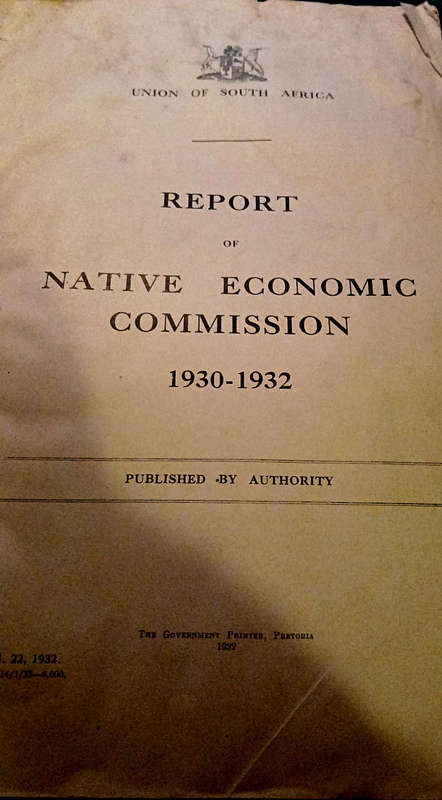
Report of Native Eeconomic Commission 1930-1932
Check my rate
| Main centres: | 1-3 business days |
| Regional areas: | 3-4 business days |
| Remote areas: | 3-5 business days |

| Main centres: | 1-3 business days |
| Regional areas: | 3-4 business days |
| Remote areas: | 3-5 business days |
Report of Native Eeconomic Commission 1930-1932 , Union of South Africa, published by Authority, 1932, original, softcover, staple binding, 346 pages, 21 cms x 33 cms x 1.6 cms, blue front cover not present otherwise condition: very good.
The Native Economic Commission's report is a significant document in the history of South Africa, providing a snapshot of the economic and social conditions of Black South Africans during a period of significant change and racial tension.
The Native Economic Commission, established in 1930, was tasked with investigating the economic conditions of Black South Africans within the Union of South Africa and making recommendations for policy improvements. The Commission's report, published in 1932, addressed various aspects of Black life, including land ownership, labor, and social condition.
Concerns covered
Land Ownership: The report examined the existing land distribution system, particularly focusing on the limitations imposed on Black land ownership and the impact on rural communities.
Labor: The Commission analyzed the conditions of Black workers in both rural and urban areas, including wages, working conditions, and the impact of pass laws on their mobility and employment opportunities.
Social Conditions:The report also considered the broader social conditions of Black communities, including education, healthcare, and housing, and identified areas where improvements were needed.
Segregation: The report was produced during a period of increasing racial segregation in South Africa, with the government actively pursuing policies to separate Black and white populations.
"Civilized Labour Policy": The government was also implementing a "Civilized Labour Policy" which aimed to favor white workers in employment opportunities.
Native Affairs Act of 1920: This Act established the Native Affairs Commission, which played a role in advising the government on Native policy and also became involved with the Native Economic Commission.
Urbanization: The report acknowledged the growing trend of Black South Africans moving to urban areas in search of work and the need for policies to address the challenges of urbanization.